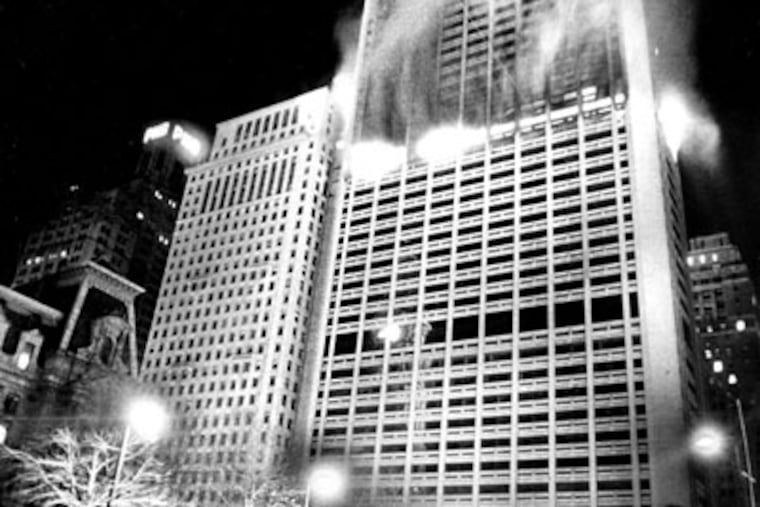One Meridian Plaza: 20 years ago, the fire that changed the nation
When Jack Bloomer and the other firefighters arrived at One Meridian Plaza that cold February night in 1991, flames were encompassing the building more than 20 stories above, leaping from floor to floor. Smoke poured into the air, and broken glass rained down.

When Jack Bloomer and the other firefighters arrived at One Meridian Plaza that cold February night in 1991, flames were encompassing the building more than 20 stories above, leaping from floor to floor. Smoke poured into the air, and broken glass rained down.
"It was obvious when we pulled up it was an ugly-looking job," Bloomer, 61, remembered yesterday.
He had no idea how bad it would get.
By the time the 12-alarm fire was declared under control 19 hours later, three firefighters were dead, 12 others were injured and a Center City high-rise was lost. The blaze, 20 years ago today, changed the city's skyline and the way the nation fights fires.
"When that fire happened, it was on the news all over the world," said Chris Jelenewicz, engineering program manager at the Maryland-based Society of Fire Protection Engineers. "The One Meridian fire was one of the most significant fires in the history of high-rise buildings."
The fire changed Bloomer, who was driving Engine 11 that night. With him were Capt. David Holcombe and Firefighters Phyllis McAllister and James Chappell.
Bloomer's the only one who made it home.
"I still think about it," Bloomer said. "I wonder, what if I'd been one of the guys inside? Would I have done what they did? It could have been me.
"It's not something you'll ever get over. It's always in the back of my mind."
That night, Bloomer recalls, "was a regular night at the firehouse" at 6th and South streets. Dinner was done, and he, McAllister and Chappell were shooting pool. The call came in about 8:30 p.m.
The fire had started on the 22nd floor, where a pile of oily rags left behind by a cleaning crew had ignited. Flames quickly spread upward. There were no sprinklers until the 30th floor.
When the platoon arrived at the scene, Bloomer's job was to stay with the truck because he was the driver. He began hooking up a hose to a hydrant at 15th and Chestnut while the other three climbed the stairs. There were no drawn-out goodbyes: Everyone had a job to do.
"It was one of those things that was understood," said Bloomer, who is now entering his 36th year as a firefighter and is assigned to Battalion 4, at 4th and Arch streets.
The trio ascending the stairs soon ran into trouble. About10 p.m., Holcombe radioed commanders that the team had become disoriented in heavy smoke on the 30th floor. A short time later, McAllister radioed that the captain was down and that the firefighters were out of air.
Two rescue teams were dispatched. By chance, Bloomer had overheard both calls. Still, he never thought that his buddies weren't coming down alive.
Only later, after the bodies had been removed from the scene, did he learn that they had been found dead on the 28th floor.
"Nobody knew how to tell me," Bloomer said. "I was the only one left from my platoon."
The Meridian fire was one of the most significant high-rise building fires before 9/11, said Jelenewicz, of the Society of Fire Protection Engineers. It changed the way that fire codes were written, pointing out inefficiencies in the fire-protection design.
Some of the changes that stemmed from the tragedy were simple ones, he said: Stairwells were marked with floor numbers so that anyone inside could tell where they were. On the night of the Meridian fire, the team had become disoriented and reported that they were on the 30th when they were in fact on the 28th.
Other changes were more significant, like calling for sprinkler systems on every floor of a high-rise.
"The whole nation looked at this fire and learned from it," Jelenewicz said.
A memorial to the lost firefighters now stands outside the Residences at the Ritz Carlton, where the Meridian once towered. It features three firefighter helmets on a granite base and the words: "To sacrifice one's own safety in the service of others requires a courage that is rare. Those among us who do are true heroes."